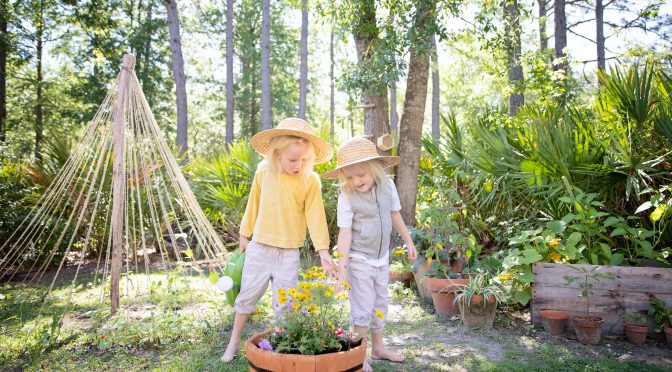While society is continually changing, the latest statistics on American childhoods are shocking and a bit frightening. According to the Child Mind Institute, “the average American child is said to spend 4 to 7 minutes a day in unstructured play outdoors, and over 7 hours a day in front of a screen.” One way that we can involve children of all ages and abilities in the outdoors is through gardening. Growing a small plot of herbs, flowers, or vegetables with kids has many benefits.
It teaches responsibility.
Planting a few beans is an excellent way to give your child a bit of experience caring for a living thing. They’ll get an opportunity to see how their efforts help determine whether plants fail or thrive. It’s also cheaper than a puppy, and you might get beans!
Kids eat more fruit and veggies.
It may be somewhat surprising that growing kale may convince your child to try it, but results from a 2016 study suggest just that. The study found that out of 14 reports looking at school and community gardening programs, ten showed that participating children increased their fruit and vegetable intake.
Gardening is excellent for stress relief.
It will come as no surprise to many gardeners that it’s an excellent activity for stress relief. Spending time outdoors together as a family can help children deal with their emotions. Interestingly, it may be more than just the exercise and fresh air. A recent study found that exposure to one specific soil bacteria, Mycobacterium vaccae, may improve moods and alleviate depression.
It improves their health.
As we mentioned above, gardening helps kids relax and make healthy eating choices. It helps in various other ways too. Gardening is good exercise, provides a healthy dose of vitamin D, and can improve children’s immune systems by exposing them to beneficial bacteria. Jack Gilbert, co-author of a book called Dirt is Good: The Advantage of Germs for Your Child’s Developing Immune System, says that being exposed to animals, plants, and soil regularly can help improve children’s immune systems and prevent illnesses like eczema and asthma.
You’re helping to create the next generation of activists.
Spending time in the garden now helps shape the adult your child becomes. A study from the American Society for Horticultural Science found that children involved in garden programs developed better environmental attitudes.
So teach your children about heirlooms and seed saving. Let them get dirty and plant rows of peas. Grow tea gardens or bean tipis together. Start planning your garden this winter! Check out our other posts, Spring Garden Activities for Kids, Get Your Kids Involved in the Garden, and 14 Varieties to Help Kids Fall in Love With Growing Food for more information.

